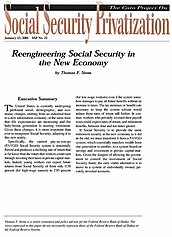The United States is currently undergoing profound social, demographic, and economic changes, shifting from an industrial base to a new information economy, at the same time that life expectancies are increasing and the baby-boom generation is nearing retirement. Given these changes, it is more important than ever to reengineer Social Security, adapting it to this new reality.
Specifically, the current pay-as-you-go (PAYGO) Social Security system is structurally flawed and produces a declining rate of return that is far lower than the return that workers could earn through investing their taxes in private capital markets. Indeed, young workers can expect future returns from Social Security of from only 0.58 percent (for high-wage earners) to 2.93 percent (for low-wage workers) even if the system somehow manages to pay all future benefits without an increase in taxes. The tax increases or benefit cuts necessary to keep the system solvent would reduce those rates of return still further. In contrast, workers who privately invested their payroll taxes could expect rates of return, and retirement benefits, between four and ten times greater.
If Social Security is to provide the same retirement security in the new economy as it did in the old, we must transform it from a PAYGO system, which essentially transfers wealth from one generation to another, to a system based on savings and investment in private capital markets. Given the dangers of allowing the government to control the investment of Social Security funds, the only viable alternative is to move to a system of individually owned, privately invested accounts.
About the Author

This work is licensed under a Creative Commons Attribution-NonCommercial-ShareAlike 4.0 International License.
